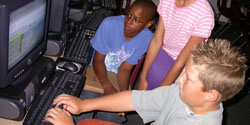

Using Knowledge
Teaching and Learning Strategies
Resources
Decision Making |
Making Use of Information
In 1929, the philosopher Alfred North Whitehead invented the term “inert knowledge” to describe the mindless accumulation of facts without purpose. David Perkins (1995) described inert knowledge as the “knowledge equivalent of a couch potato” (p. 22). It just sits around taking up space. The purpose of knowing things is, after all, to do something with what we know.
This point of view is especially important in project-based learning. It is also important in the integration of ICT when learners use ICT to learn and to show what they have learned. Marzano’s Knowledge Utilization component of the cognitive processes includes four ways of using knowledge: decision making, problem solving, experimental inquiry, and investigation.
Although teachers often worry that an emphasis on using knowledge rather than basic skills will result in lower test and exam results, a synthesis of research studies conducted by the George Lucas Foundation (2001) found that in many cases, the opposite was true. Learners who studied mathematics through projects scored as well, or, in some cases, even better, than their counterparts who participated in more conventional learning activities.
Decision Making >
The process of decision making is used when a person has to decide between two or more choices. Within a project activity learners will be called upon to use this process frequently as they choose topics, resources, and methods of presentation.
Problem Solving >
Problem solving occurs when learners encounter a challenge or obstacle to the completion of a goal. Due to the complex nature of most projects, learners in project-based learning classrooms must be expert problem solvers.
Experimental Inquiry >
Experimental Inquiry is a particular type of using knowledge because it is governed by accepted rules of method and evidence. The most widely known type of experimental inquiry is the scientific method. Other types of experimental inquiry are experiments where some kind of treatment (such as a teaching method) is given to one group of children and withheld from another. This type of using knowledge has strict guidelines regarding the kind of evidence that is accepted, how this evidence is collected, and how conclusions are reached.
Investigation >
Investigation is the process “of generating and testing hypotheses about past, present, or future events” (Marzano 2000, 47). Investigation is like experimental inquiry in some ways, but it differs in its methods and kinds of evidence. People do not directly observe and collect data in an investigation. They get their information from the writings and experiences of others. The conclusions of an investigation are judged based on the strength and logic of their arguments.
It is important to remember that the cognitive skills of decision making, problem solving, experimental inquiry, and investigation, do not correspond directly to specific projects. A project, such as one in which primary children study different species of bears and use what they learn to develop a children’s guide to the bear section of the zoo are using problem solving, decision making, and investigation cognitive skills. The practice of these complex thinking strategies are based on lower-level skills such as analysis, comprehension, and retrieval.
References
George Lucas Educational Foundation. (2001). Project-based learning research.
www.edutopia.org/node/887*
Marzano, R. J. (2000). Designing a new taxonomy of educational objectives. Thousand Oaks, CA: Corwin Press.
Perkins, D. (1995). Smart schools: Better thinking and learning for every child. New York: The Free Press.
